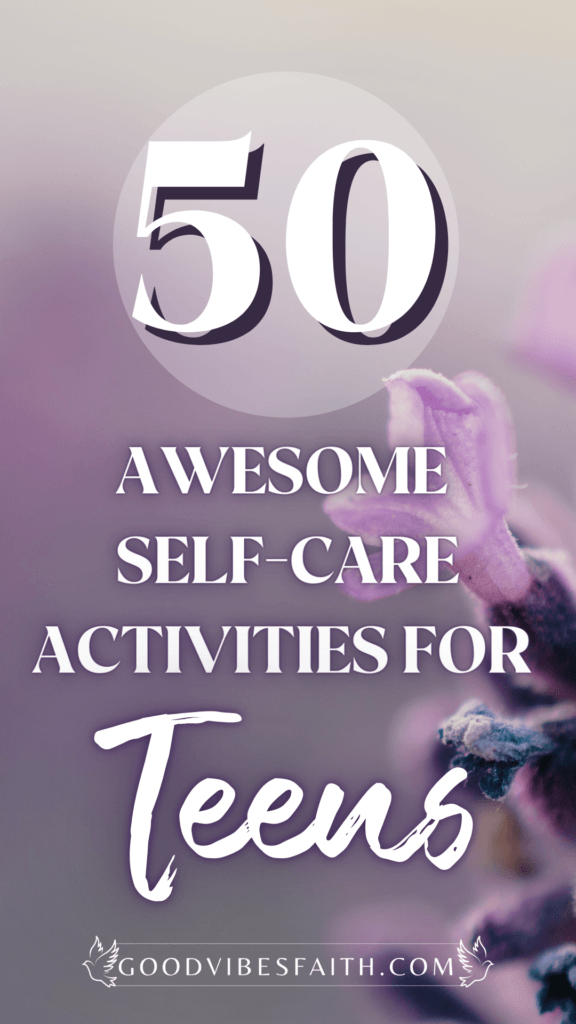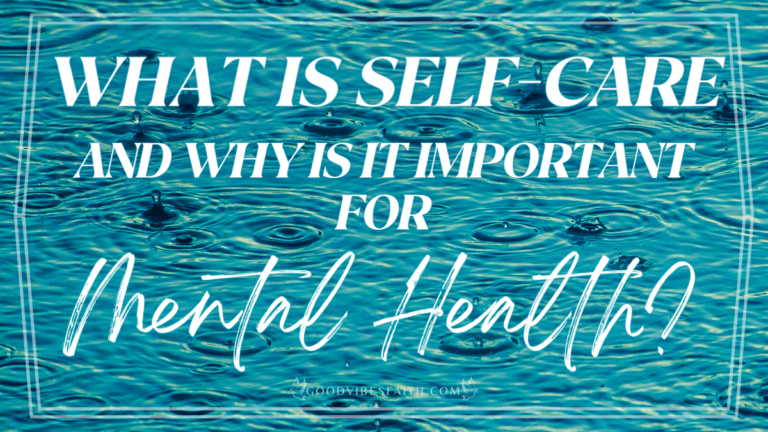Self-Care For Teenagers: 50 Awesome Self-Care Activities For Teens

If you’re like most teens, you’re probably feeling stressed out more often than not. Between school, sports, extracurriculars, and your social life, it seems like there’s never enough time to just relax. That’s why it’s important to make self-care a priority. By regularly making some time for yourself, you can reduce stress and improve your overall well-being. Below are 50 awesome self-care activities for teens that will help you de-stress and unwind. But first of all, let’s find out what self-care is and what are its benefits.
Defining Self-Care
Self-care is anything that you do to take care of yourself, both physically and mentally. It can be anything from getting enough sleep to eating healthy foods to exercise. Basically, if it’s something that makes you feel good and is good for you, it’s probably considered self-care.
Why Self-Care is Important for Teens
Self-care is important for everyone, but it’s especially crucial for teenagers. That’s because adolescence is a time when you’re going through a lot of changes, both physically and emotionally. You’re also under a lot of pressure to succeed in school and make friends. All of this can be very stressful.
Making Self-Care a Priority
With all that being said, it’s clear that self-care is important for teenagers. But how can you make sure that you’re taking care of yourself? The first step is to make self-care a priority. That means setting aside time each day (or at least each week) to do something just for yourself. It doesn’t have to be anything big or time-consuming. Just something that makes you feel good.
How to Practice Self-Care:
Now that you know what self-care is and why it’s important, it’s time to start practicing it! Here are a few tips to help you get started:
- Make a list of things that make you feel good. This can be anything from taking a walk to listening to music to taking a bubble bath. (Get some ideas from the list below)
- Set aside time each day (or each week) for self-care. Put it in your calendar or set an alarm on your phone so you don’t forget.
- Start small. If you’re not used to taking care of yourself, it can be overwhelming to try to do too much at once. Just pick one or two things from your list to start with.
- Be patient with yourself. Self-care is a journey, not a destination. It might take some time to figure out what works for you. And that’s okay!
The Benefits of Practicing Self-Care:

There are so many benefits to practicing self-care, both in the short term and the long term. Here are just a few of the ways it can improve your life:
- Reduce stress: One of the most important benefits of self-care is that it can help reduce stress. When you take time for yourself, you’re giving your body and mind a chance to relax and recharge. This can help you feel calmer and centered, which can in turn help you manage stress better.
- Boost your mood: Another great benefit of self-care is that it can boost your mood. When you do things that make you feel good, it’s natural to feel happier and more positive. This can help you get through tough times.
- Improve your physical health: Self-care isn’t just good for your mental health—it’s also good for your physical health. When you take care of yourself, you’re more likely to eat healthy foods, exercise regularly, and get enough sleep. All of these things can help improve your overall physical health.
- Strengthen your relationships: Self-care can also help strengthen your relationships. When you’re taking care of yourself, you’re more likely to be in a good mood and have the energy to spend time with loved ones. This can help you build stronger, more meaningful relationships.
- Increase productivity: Contrary to popular belief, self-care can help you be more productive. When you’re taking care of yourself, you’re giving your body and mind the energy they need to function at their best. This can help you get more done in both your personal and educational lives.
- Boost your self-esteem: Finally, self-care can help boost your self-esteem. When you make an effort to take care of yourself, it sends the message that you’re worth taking care of. This can help you feel better about yourself and increase your overall confidence.
50 Self-Care Activities for Teens
There are endless possibilities when it comes to self-care activities. It just depends on what you enjoy and what makes you feel good. Here are 50 ideas to get you started:
1. Get enough sleep: Most teens need about 8-10 hours of sleep every night, but some may need more. Make sure you’re getting enough rest by going to bed at a reasonable hour and waking up feeling refreshed.
2. Eat healthily: Eating a balanced diet that is rich in nutrients helps your body to operate at its best. Fuel your body with plenty of fruits, vegetables, and whole grains. And don’t forget to drink plenty of water!

3. Exercise: Exercise releases endorphins, which have mood-boosting benefits. Take a brisk walk, go for a run, or join a sports club.
4. Take some time for yourself: Dedicate some time each day to do something that you enjoy, such as reading, writing, painting, or listening to music.
5. Connect with nature: Spend time outside in nature, and take in the fresh air. Even a short walk in the park with your dog and parent can help to improve your mood.
6. Be social: Spending time with friends and family can help reduce stress levels. Make plans to hang out with your friends, or have a family game night.
7. Laugh: Laughter is known to be one of the best forms of medicine. Watch your favorite comedy show, read a funny book, or tell jokes with your friends.
8. Have a bubble bath: Add some soothing aromatherapy or play some calming music to create a relaxing atmosphere.
9. Prayer and Meditation: Meditation can help to clear your mind and improve focus. Practice deep breathing exercises, and try to meditate for 10 minutes each day. Prayer can also be a form of self-care, as it can help you to feel more connected to a higher power.
10. Get organized: A clutter-free environment can help reduce stress levels. Spend some time each day decluttering your room, and make sure to keep up with your schoolwork and other responsibilities.
11. Breathe: When you’re feeling overwhelmed, take a few deep breaths and focus on your breath. This simple act can help to calm your mind and body.
12. Take breaks: When feeling stressed, it’s important to take breaks throughout the day. Get up and stretch, take a walk, or listen to calming music.
13. Avoid negative people: Surround yourself with positive people, and avoid those who tend to bring you down. Spend time with friends who make you feel good about yourself, and stay away from toxic relationships.
14. Say no: It’s okay to say no when you’re feeling overwhelmed. You don’t have to do everything that’s asked of you, and it’s perfectly fine to say no to plans if you’re not up for it. Removing the burden of obligations can help to reduce stress.
15. Plan sleepovers: Spending time with friends can be a great way to relax and have fun. Plan a sleepover, and make sure to have plenty of snacks and movies on hand.
16. Forgive yourself: Everyone makes mistakes, so it’s important to forgive yourself when you do. Let go of any guilt or shame you’re feeling, and move on from whatever it is that’s bothering you.
17. Take a break from social media: If you’re finding that social media is causing you more stress than it’s worth, take a break from it. You don’t have to be active on every platform, and you can take a break from checking your notifications if it’s all getting to be too much.
18. Write a story: Writing can be a great way to express yourself and get your thoughts down on paper. Write a short story, create a character, and let your imagination run wild.
19. Puzzles: Challenging your mind with puzzles can help to improve your mood. Try solving a crossword puzzle, sudoku, or another type of puzzle when you’re feeling stressed.
20. Listen to nature: There’s something about listening to the sounds of nature that can be very calming. Whether it’s the sound of rain, waves crashing against the shore, or birds chirping in the trees, let nature provide some background noise to help you relax.
21. Write in a journal: Writing in a journal is a great way to release any pent-up emotions you may be feeling. Write about whatever is on your mind, and don’t worry about editing or censoring yourself.
22. Practice gratitude: One way to combat negative thinking is to practice gratitude. Each day, take some time to think about things that you’re thankful for. This can help to shift your focus from the negative to the positive.
23. Read inspirational quotes: Sometimes all you need is a little inspiration. Keep a list of your favorite quotes, and read them when you’re feeling down.
24. Make some fun videos: Videos are a great way to express yourself and have some fun. You can make vlogs, challenge videos, skits, or anything else that you think would be entertaining.
25. Do something nice for someone else: One of the best ways to make yourself feel good is to do something nice for someone else. Whether it’s cooking a meal for a friend, complimenting someone, or simply lending a listening ear, paying it forward can help you to feel better about yourself.
26. Draw or color: Art can be therapeutic. If you’re feeling stressed or down, grab some coloring pencils and let your creative juices flow.

27. Play with a pet: Pets can provide companionship, love, and affection. Spending time with a furry friend can help to boost your mood and relieve stress.
28. Start a mini garden of your own: Gardening can be a great way to relax and connect with nature. Even if you don’t have a lot of space, you can start a small garden with just a few plants.
29. Drink some tea: Tea has long been associated with relaxation. Take a break from your busy day, and enjoy a cup of your favorite brew.
30. Cook with a parent: Cooking can be a fun and bonding experience. Ask a parent or guardian to help you make your favorite comfort food. Not only will you get to enjoy a delicious meal, but you’ll also get quality time with someone you love.
31. Learn something new: When you’re feeling down, it can be helpful to learn something new. Challenging yourself with a new task can help to take your mind off of negative thoughts. This could be anything from learning a new language to taking up a new hobby.
32. Create a vision board: A vision board is a collage of images and words that represent your goals and dreams. Making a vision board can be a fun and creative way to focus on the positive things in your life.
33. Watch a funny movie: Laughter is the best medicine. When you’re feeling down, find your favorite comedy and let the laughs lift your spirits.
34. Play a game: Games can be a fun and enjoyable way to take your mind off of things. Whether you’re playing alone or with friends, games can help to improve your mood and reduce stress.
35. Take a trip down memory lane: Looking at old photos and memories can help to boost your mood and make you feel more positive about life.
36. Make a list of your accomplishments: When you’re feeling down, it can be helpful to remind yourself of all that you’ve accomplished. This can help to give you a sense of pride and boost your self-confidence.
37. Write a letter to yourself: Sometimes it can be helpful to hear your own words of wisdom. Write a letter to yourself, and be sure to include all of the things you love about yourself. Reading this letter when you’re feeling down can help to boost your mood.
38. Give yourself a hug: Sometimes all you need is a little self-love. When you’re feeling down, give yourself a big hug. This can help to comfort and relax you.

39. Face masks and painting nails: Home spa days are the best! If you’re feeling down, take some time to pamper yourself. Draw yourself a bath, put on a face mask, and paint your nails. This can help you to relax and feel more positive about yourself.
40. Essential oils: Aromatherapy can be very relaxing and therapeutic. If you’re feeling down, try diffusing some essential oils. This can help to improve your mood and ease stress. Lavender oil is especially known for its calming and soothing properties.
41. Talk to someone you trust: When you’re feeling down, it can be helpful to talk to someone you trust. This could be a friend, family member, therapist, or any other person to who you feel comfortable talking. Talking about your feelings can help to make them more manageable and less overwhelming.
42. Read: Reading can be a great way to escape from reality and enter into another world. Whether you’re reading fiction or non-fiction, take some time to lose yourself in a good book.
43. Listen to music: Music can have a powerful effect on your mood. When you’re feeling down, put on your favorite tunes and let the music lift your spirits.
44. Create a bucket list: A bucket list is a list of things you want to do in the future. Creating a bucket list can be a fun and exciting way to focus on the positive things in life.
45. Watch the sunrise or sunset: There’s something about watching the sun rise or set that can be very calming and relaxing. If you’re feeling down, take some time to enjoy the beauty of nature.
46. Write poetry or songs: Writing poetry or songs can be a great way to express your emotions. This can be a cathartic experience, and it can also help you to see your feelings in a new light.
47. Dance: Dancing is a great way to let loose and have some fun. Put on your favorite tunes and get your groove on. You’ll feel better in no time.
48. Spend time with animals: Animals can be great companions. They provide unconditional love and can help to reduce stress and anxiety. If you don’t have a pet, consider spending time with a friend’s pet or visiting a local animal shelter with your parents.
49. Yoga: Yoga is a great way to relax and unwind. Many different yoga poses can help to improve your mood and reduce stress.
50. Arts and Crafts: Getting creative can be a great way to boost your mood. Whether you’re painting, drawing, or doing some other type of art, the act of creation can be therapeutic.
51. Just be: Sometimes the best thing you can do is simply be. Be present in the moment and accept whatever you’re feeling. This can be a difficult thing to do, but it can be very freeing.
52. Treat yourself: When all else fails, sometimes you just need to treat yourself. Whether it’s buying a new book, getting a manicure, or indulging in your favorite dessert, do something special for yourself. You deserve it!
Self-care is an important part of overall wellness. It’s not selfish to take care of yourself—it’s necessary. When you make self-care a priority, you’re not only taking care of your own physical and mental health, but you’re also setting a good example for others. So don’t wait—start practicing self-care today!




